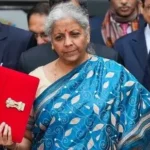ArdorComm Media Bureau
February 1, 2024
Finance Minister Nirmala Sitharaman outlined a comprehensive set of economic reforms aimed at driving growth in India, presenting the interim budget for 2024-25. This budget is deemed as an economic manifesto for the Bharatiya Janata Party (BJP) and is expected to provide crucial insights into the government’s plans for fiscal consolidation, borrowings, and future taxation policies in the run-up to the 2024 Lok Sabha elections.
Finance Minister Nirmala Sitharaman announced a series of major initiatives aimed at driving economic growth and addressing societal challenges. Here are the key initiatives highlighted in the budget:
- Capital Spending Boost: The capital spending for the fiscal year 2024-25 sees a substantial 11% increase, reaching ₹11.11 lakh crore, equivalent to 3.4% of the GDP. This boost is expected to have a multiplier effect on economic growth and employment.
- Aviation Sector: Indian air carriers have placed orders for 1,000 new aircraft, signaling a significant move to strengthen the aviation industry.
- Deep Tech for Defense: A new scheme is set to be launched to strengthen deep tech capabilities in the defense sector, showcasing the government’s commitment to technological advancements in national security.
- Agricultural Investments: The government plans to promote both public and private investments in post-harvesting agriculture activities. Additionally, the application of nano Di-Ammonium Phosphate (DAP) on various crops will be expanded across different agri-climatic zones.
- Railway Infrastructure: Three major railway corridors, including one dedicated to cement transportation, will be constructed. Additionally, 40,000 normal railway bogies will undergo conversion to meet the Vande Bharat standard.
- GDP Redefined: Minister Sitharaman introduced a new definition for GDP, focusing on governance, development, and performance as the key components.
- Skill India Mission: Over 1.4 crore youth were trained and upskilled under the Skill India Mission, highlighting the government’s commitment to enhancing employability through skill development programs.
- Macroeconomic Stability: Sitharaman emphasized macroeconomic stability, assuring that the country’s economy is on a positive trajectory.
- Inclusive Focus: The budget reiterated the government’s commitment to addressing systemic inequalities, with a specific emphasis on outcomes for the poor, women, youth, and farmers. Sitharaman emphasized a focus on outcomes rather than outlays.
- Foreign Investment Encouragement: Measures were proposed to encourage sustained foreign investment, including negotiating bilateral investment treaties. Rs. 75,000 crores will be provided as interest-free loans to support milestone-linked reforms by state governments.
- Societal Changes: A high-powered committee will be formed to comprehensively address challenges arising from population growth and demographic changes, providing recommendations for comprehensive solutions.
- Tax Proposals: In a move aimed at the upcoming elections, Sitharaman proposed the withdrawal of all pending tax demands up to ₹25,000 until 2009-10 and ₹10,000 until 2014-15, benefiting 10 million taxpayers. The income tax rates remained unchanged, reflecting confidence in the overall economic scenario.
- Fiscal Deficit: The budget showcased a better-than-expected fiscal deficit of 5.8%, with a target of 5.1% in 2024-25, a development welcomed by experts.
- Transformative Initiatives: The budget outlined transformative initiatives spanning various sectors, including rooftop solarisation, electric vehicle charging, post-harvest activities, housing for the middle class, expansion of medical colleges, vaccination for girls, comprehensive maternal and child healthcare program, and extension of Ayushman Bharat coverage.
The comprehensive set of initiatives unveiled in the interim budget reflects the government’s commitment to steering the economy towards a robust and resilient future.


